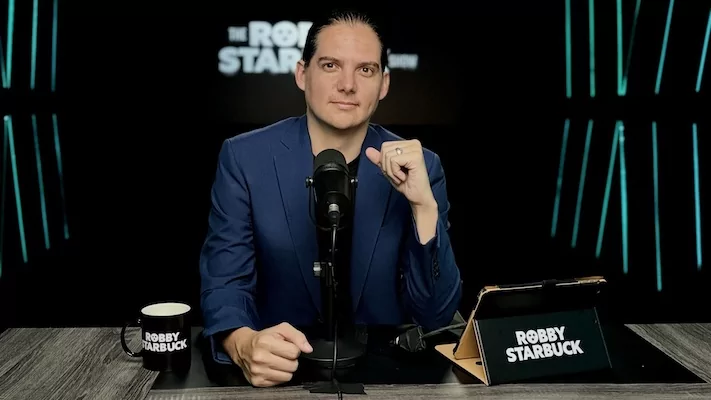
EXCLUSIVE — Robby Starbuck, a popular Republican activist who has successfully pushed companies to rein in their diversity, equity, and inclusion programs, said an election victory for former President Donald Trump would lead to a major retreat by big business in the culture war.
Starbuck, 35, is a figure with an army of more than 650,000 followers on X who are willing to push back against companies whose policies he and Republicans brand as “woke” or see as abdicating their fiduciary duty of maximizing profits.
In an exclusive interview with the Washington Examiner, Starbuck discussed the movement’s growth, which has seen some major victories by getting large corporations to back away from their corporate DEI policies. He also gamed out what is next for DEI depending on whether Trump or Vice President Kamala Harris wins and what his next steps might be.
“I think after Trump is elected — with the hope that that happens — I think what people could expect is that this would definitely be something that federally would change,” Starbuck told the Washington Examiner. “You know, you would stop seeing the ludicrous requirements that have been put in place that have forced many businesses into adopting woke policies.”

Starbuck said a Trump administration would wipe away DEI at the federal level and hypothesized that there might be someone the Trump administration taps to oversee a process of dismantling federal DEI infrastructure.
David Burton, a senior fellow in economic policy at the Heritage Foundation, said while there has been some rollback of DEI, and the related matter of corporate-level environmental, social, and governance policies, little has changed at the federal level.
For instance, Burton said there is a “DEI office” in almost every federal agency, and the government is trying to push diversity and equity initiatives in federal procurement and educational accreditation.
“I think it would be unlikely that you’d see a comprehensive reversal of everything that the Biden administration has done unless the White House flips,” Burton told the Washington Examiner.
Starbuck emphasized that these DEI edicts and guidelines are entirely different from anti-discrimination laws, which have already been on the books for many years.
“These are just inventions of a machine that intends to use, and has been using, DEI as a Trojan horse for left wing policy,” he said.
However, Starbuck sees a Trump win as something that could push beyond the bounds of unraveling diversity, equity, and inclusion initiatives in agencies and at the federal level. He said a wholesale push to dismantle those systems would then filter down to the private sector.
“I think that’s something that, no question, I expect to happen,” Starbuck said.
Starbuck argued that he and his followers have used capitalism, word of mouth, and the power of consumers’ wallets to shape policy in the corporate world. That push could be greatly accelerated with a likeminded White House.
“I think it will ultimately bear fruit throughout not just the government but the entire corporate landscape,” he said.
Starbuck said one company that ended up rolling back its DEI policies in response to his pressure actually said it wanted to dial it back even further — but couldn’t because the company had a contract with the Defense Department.
He used the story as an example of how changes at the federal level could filter through to the boardrooms of corporations. In this case, he said the company’s legal team warned that if it further dismantled a certain part of its DEI policy set, it could lose its contract with the government.
Starbuck has notched some major, and well-publicized, victories.
For instance, home improvement giant Lowe’s backed away from some of its DEI policies amid pressure from Starbuck and associated Republican activists. As part of that, Lowe’s is no longer participating in corporate surveys from the gay rights group Human Rights Campaign.
Deere and Company, the maker of John Deere tractors and other farm machinery, recently scaled back its DEI initiatives. The company said it will no longer sponsor “social or cultural awareness” events.
Tractor Supply announced in June it was changing its DEI positioning. For instance, it will refocus its team member engagement groups, eliminate DEI positions and goals, stop sponsoring nonbusiness activities such as voting campaigns and gay pride festivals, and withdraw its carbon emission goals.
And under pressure from Starbuck, iconic motorcycle manufacturer Harley-Davidson said it would be ending its relationship with the Human Rights Campaign. The company also said it would be reviewing sponsorships and the organizations it is affiliated with.
However, Starbuck said if Harris wins, it could mark further entrenchment of DEI at the federal level.
“It’s gonna get much worse from the standpoint of codifying this within the law,” he said. “I think that you’ll see even more rigid requirements when it comes to grants and contracts, and I think that that will institutionalize it further in certain sectors.”
But even if Harris wins, Starbuck said he will continue to have wins on dialing it back within consumer-facing businesses. The power of a vocal contingent of customers is enough to effect change within individual companies, he said. Starbuck said if just 15% or 20% of customers are willing to pull their money, corporate behavior will change.
“So I think you’ll still see corporate change for consumer-facing businesses, but only to the degree that the government has not codified things,” he said.
Starbuck said one reason for his success is fatigue related to DEI infrastructure and policies and departments at the board level.
“Most executives are competent enough to realize that their DEI department is nothing but headaches, and as a result of that, many of them want off-ramps because they’re like, OK, they produce nothing, now we’re able to actually say they’re a full-on liability so let’s jettison this stuff,” Starbuck said.
He said there is also another camp of executives who he describes as “true believers” in DEI. For those, he said the economic reality of possible boycotts and pushback is what prompts them to dial back some of their policies.
“If you just look at the economic reality of what we’ve done. When Tractor Supply was our focus for three weeks, they lost almost $3 billion in market cap,” he said.
“We’re giving an excuse, in a way, to companies that already have fatigue on these policies that have done nothing but suck money and suck time with all the division that they’ve caused,” he said.
Starbuck said his team is “very meticulous” in how they investigate each company they plan to feature. He said he has a couple of full-time workers and is looking to hire some more full-time researchers soon.
Starbuck said he has been surprised by the accuracy of the “mainstream media” coverage of his campaign.
“But I would say there’s been extraordinarily fair coverage of what’s going on and I think a recognition from the media that this is a very important moment,” Starbuck said.
As for next steps — it will come down to the November elections.
Starbuck expressed openness to serving a future Trump administration in some capacity if he thought it would be helpful to the overall mission. However, he said regardless of who wins, the public should expect him to be more aggressive.
He said, however, if Harris wins, they will need to be more aggressive and show their teeth to get companies to change.
CLICK HERE TO READ MORE FROM THE WASHINGTON EXAMINER
Starbuck doesn’t attribute his success primarily to himself, but rather to the large following he has and other Republican allies.
“Without them, I’d just be screaming into a void,” he said. “Companies wouldn’t listen if it was just me. It’s all the people sharing it and the way that the messages resonated with people who have just had enough. I mean, your average worker who’s been forced to do these trainings is just absolutely sick of it.”






